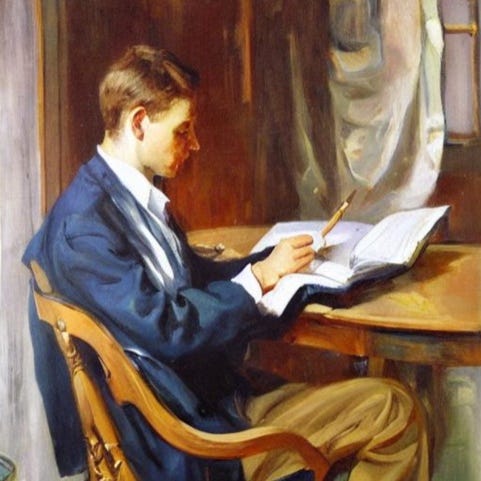Leave my soup alone!
Short story
Maria lives alone, but she doesn't feel lonely. What she feels is longing, especially after her husband died in a war 30 years ago. Three shots. That's how she was told the news. Three shots is how long a human life lasts in war.
From time to time, even after all these years, Maria can still hear the echo of those shots at night. She likes to believe that this is a sign that Julio, her husband, has come to visit her and that, as he always did before going to sleep, he runs his hand through Maria's long hair, now lightened by age.
That wasn't the case today. Even though her country was at war again, Maria slept deeply, and when she woke up she felt that longing, the same longing that has become even stronger since her only son was enlisted in the army. She hasn't heard from him for a month. Despite this, she feels he's fine, or at least, no stranger dressed in black has brought her the news of the three shots. Black is the color of the eyes, the face and the expression of someone who has lost a loved one.
Maria lives isolated from the nearest village, in a small wooden house that she and her husband built. Maria is tough, resilient and you can see it in her rugged hands, wrinkled by 75 years of life. Even so, they still have enough strength and traction to cultivate the vegetables that supply the house. That's probably why Maria doesn't feel lonely, only longing. People with calloused hands have a heart that beats stronger and louder than three gunshots.
Early this morning, Maria had to walk to the village. Twenty minutes is how long it takes her old but sturdy legs to walk the narrow, often dirt track, whenever she has to go to the pharmacy to get the pills that keep her body healthy.
The dry, brownish leaves of the Ácers on the side of the road proclaim autumn, the season when the cold, light winds from the north blowing across your back like someone enveloping you in whispers, show that despite everything, your skin still feels and breathes.
It's dawn, the sun isn't yet peeking out from behind the mountain and the road lamps are still burning. But Maria isn't afraid of the dawn. What she is afraid of is the wars and the three shots that brought down her husband. As she walks, Maria remembers the life she is slowly leaving behind.
By the time she returns home, the sun is high in the sky. Even though it's fall, it's going to be a bright, warm day. Maria decides to make soup, the same soup her husband used to eat for breakfast when he came back from the fields with grass for the animals. In those days life was harder, everything was done by hand, and hands were a treasure to be preserved. When things are crafted by hand, they have more value, even human life is worth more, people sleep better, smiles are more spontaneous and a protective hug helps to eliminate the strongest of agonies.
At the time when Maria's parents lived, there were no wars or gunfire, the world was all about each person's garden, and a fireplace was enough to bring people together. Being happy was as simple as life.
It smells like soup. The scent of onions awakens the memory of Julio, Maria's husband. But she doesn't feel lonely. It's longing that she feels, because longing is a good thing, it's a sign that you've been happy and loved, and that you've been able to love.
Longing is not absence, it is presence. It's not abandonment or departure. It's staying, it's longing, which in a way brings hope. That's what Maria feels, hope that one day she will meet Julio again, or that despite the three shots he will return.
The cloud of steam, flavored by the soup, floats through the house, stimulating Maria's nostrils and memory. It will be ready in no time and she will be able to sit at the same table as 50 years ago, now eating alone, but in peace.
Today, there are no heavenly hymns in the skies. You hear the roar of flying machines. In the war in which her country is involved, there is no more gunfire, as there was in her husband's time. Now there's rain, but it's not the rain that used to fertilize your vegetable garden. Now the rains are made of metal and fall from the sky with a thunderous roar, causing people to disappear under craters in the earth and leaving scars on the souls of those who live. Fear and longing are what you feel most when you're at war.
While savoring her soup, Maria thinks about Júlio and her son. Francisco wanted to be an engineer. He was a young dreamer, just like Maria, who wanted to be a dressmaker. She always loved using his hands like a magician who makes new things appear out of thin air. Today those calloused hands, creased by time, have made a tasty soup of memories and longings.
As she eats it, Maria shouts in a threatening tone, for the warlords to hear,
- Leave my soup alone!
This my first post here. Thanks for reading it. All comments are welcome.
If you enjoy my story check out my Substack Publication Outside the Therapy Room where I share fiction, poetry and essays on human behavior and emotions:





She is tired but the cooking of soup seems to be what she needs for the day. The day of remembering, the day when things used to be calmer like eating a hot bowl of soup.
My sister, Gwendolyn, said it for me: your story hit all my buttons. You are a wizard with the keyboard.